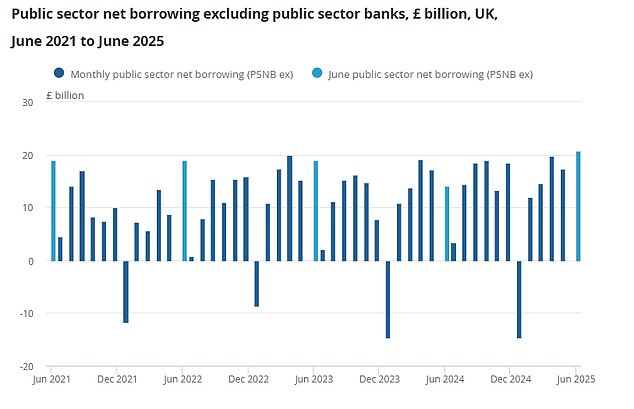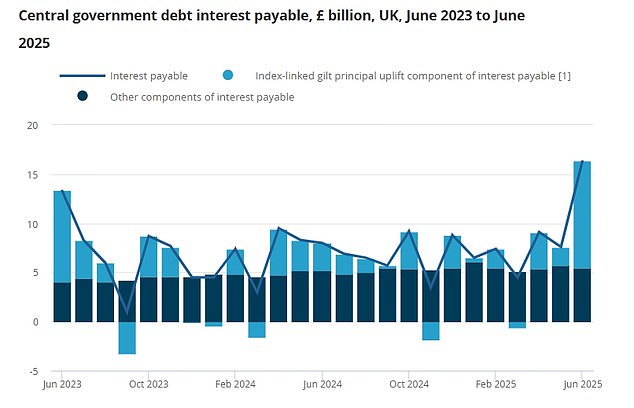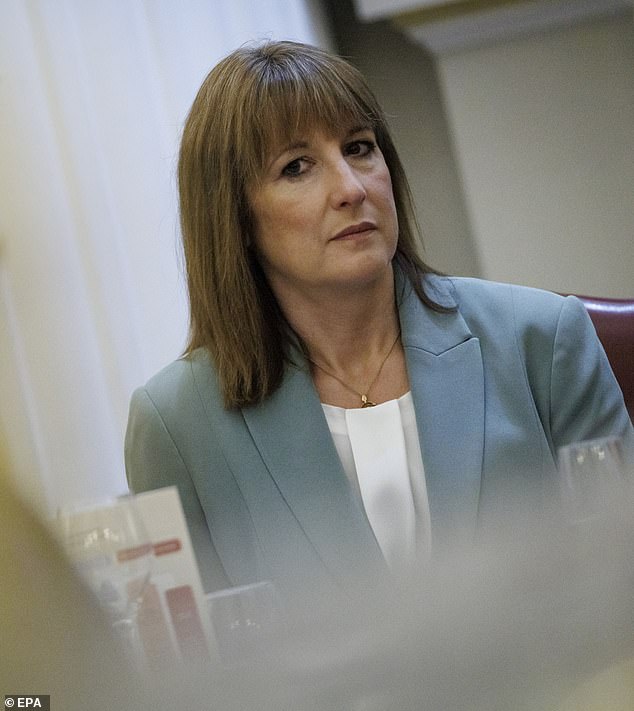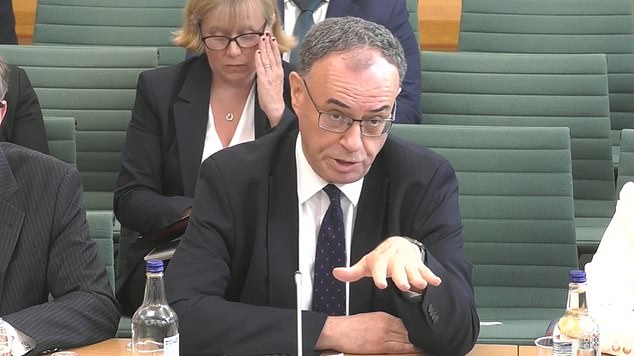Rachel Reeves‘ misery was compounded today as government borrowing hit a new record for June outside of Covid.
The public sector borrowed £20.7billion last month, far higher than the £17.6billion analysts had pencilled in.
The level was £6.6billion higher than a year earlier and only behind the height of the pandemic in 2020 since comparable figures began in 1997.
Alarmingly for the Chancellor, the surge was driven by debt interest as well as higher spending. Servicing debt cost £16.4billion over the month, more than double the number for the previous June.
Bank of England governor Andrew Bailey tried to calm nerves this morning, insisting rising interest rates on government borrowing was a global phenomenon and the UK was not ‘out of line’.
Borrowing for the first three months of the financial year to date stood at £57.8billion, £7.5billion more than the same three-month period in 2024.

The public sector borrowed £20.7billion last month, far higher than the £17.6billion analysts had pencilled in

Alarmingly for the Chancellor, the surge was driven by debt interest as well as higher spending

Ms Reeves is desperately hunting for options to increase taxes as she faces an estimated £30billion black hole in the public finances at the Autumn Budget
Ms Reeves is desperately hunting for options to increase taxes as she faces an estimated £30billion black hole in the public finances at the Autumn Budget.
The tax burden is already set to hit a new high as a proportion of GDP after the last Budget imposed a £41billion increase – the biggest on record for a single package.
Labour has ruled out increasing income tax, employee national insurance or VAT.
Many believe the Chancellor will opt to extend the long-running freeze on tax thresholds.
The policy, in place since 2022, is due to end in 2028-29. By that point it will have dragged an extra 4.2million people into the tax system as wages rise.
Ms Reeves has been carefully avoiding ruling out a ‘wealth tax’ – with backbenchers pushing for 2 per cent levy on assets worth more than £10million.
However, she is thought to be privately opposed to the move, with tax experts and Cabinet ministers warning it would only drive away more wealth people from Britain.
A raid on pensions is still said to be on the table, with fears that the Treasury is again looking at slashing reliefs.
Currently higher-rate earners are spared 40 per cent tax on money that is put into retirement funds.
However, reducing the relief to the 20 per cent basic rate could raise around £15billion for the government.
The idea was rejected at the Budget last year, but Ms Reeves’ situation has dramatically worsened.
Chief Secretary to the Treasury Darren Jones said: ‘We are committed to tough fiscal rules, so we do not borrow for day-to-day spending and get debt down as a share of our economy.
‘This commitment to economic stability means we can get on with investing in Britain’s renewal, including fixing our NHS, strengthening our national defence and building hundreds of thousands of affordable homes through our plan for change.’

Bank of England governor Andrew Bailey tried to calm nerves this morning, insisting rising interest rates on government borrowing was a global phenomenon and the UK was not ‘out of line’
But shadow chancellor Mel Stride said: ‘Rachel Reeves is spending money she doesn’t have.
‘Debt interest already costs taxpayers £100billion a year – almost double the defence budget – and it’s forecast to rise to £130 billion on Labour’s watch.
‘Labour’s jobs tax and reckless borrowing is killing growth and fuelling inflation – paving the way for more tax hikes and more borrowing in the autumn. Make no mistake – working families will pay the price for Labour’s failure and costly U-turns.
‘Only the Conservatives, under new leadership, will break this cycle. Only the Conservatives believe in sound money and low taxes.’












